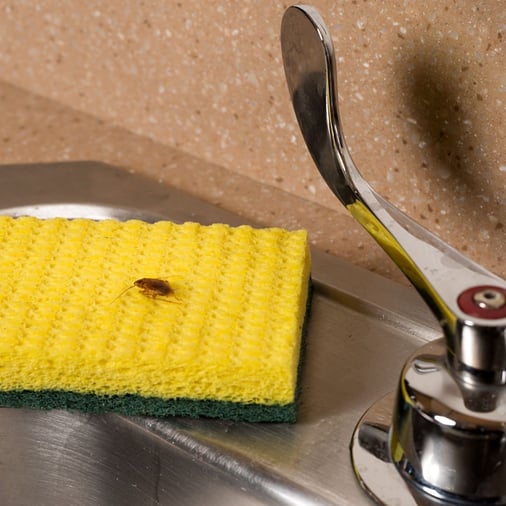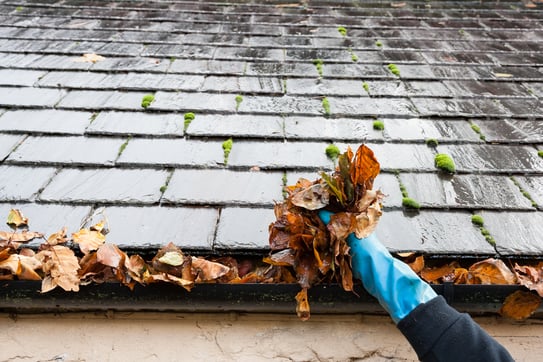Have you ever noticed that there are more bugs in your bathroom or basement after a rainy day? This phenomenon isn’t uncommon or unexplainable. In New Jersey and Pennsylvania, pests are most active in the spring and summer. It’s during this time of year that we experience the majority of rainfall. It’s also no secret that pests love moisture. Creepy crawlies that were out of sight can come sneaking into your home after a rainy day. What attracts bugs to your house after it rains? Let’s find out.
What kinds of bugs go indoors after it rains?
Pests, like most living things, require water to live. Moisture in general is especially desirable to species that breed in water and eat damp wood. Humidity and heavy rains create the perfect environment for pests to thrive. Although most pests are more active when conditions are wet, the most common are cockroaches, termites, centipedes, and millipedes.
Cockroaches

After periods of very heavy rain, cockroaches can be pushed up through drains and around unsealed utility pipes as water levels rise through sewer systems. With nowhere to go, they can recede into dryer areas such as your bathroom.
Termites
Termite activity can increase after heavy rains. Subterranean termites are attracted to decaying or damp wood that can be a result of localized storms. If you have poor drainage around the foundation of your home, water damage can lead to termite feeding and subsequent infestations. Old stumps or fire wood piles around your yard are especially susceptible to termite activity when rain-soaked or damp.
Centipedes & Millipedes
Centipedes thrive in moist environments such as basements and bathrooms. After it rains or summer days with high humidity, basements that aren’t properly sealed can suffer from centipede activity. Centipedes can squeeze through small openings on the exterior of your home, as well as through torn window screening, broken dryer or crawlspace vents, and gaps under windows and doors.
Millipedes do not live indoors. If you find them in your basement, it’s most likely because rain water pushed them up and through some gaps around the exterior of your home. You can simply remove them and throw them away. Even if you miss some of them, millipedes will not reproduce indoors, and will die quickly. Millipedes feed on decaying plant matter and prefer to live where they can find high levels of moisture and protection. Ideal living spaces include under rocks, mulch beds, flowerbeds, and gardens. You may see them in your home when it's too dry or hot outside and your basement provides significant moisture.
Why are there more mosquitoes after it rains?
To understand why mosquito activity increases after a rainy day, you need to understand the mosquito lifecycle.
In general, mosquitoes are attracted to stagnant water in large or small quantities such as ponds, rain water collected in buckets around your home, in bird baths, and on plastic play sets in your back yard. Clogged gutters offer that same environment which is potentially more dangerous if your gutters aren’t cleaned regularly.
Once mosquitoes find standing water, adults lay “rafts” of up to 200 eggs stuck together at a time which hatch into larva typically within 48 hours. Throughout the life cycle of a mosquito, the only time they live above water is in adulthood. Water and areas around your property with poor drainage are generally undisturbed, allowing the life cycle of a mosquito to continue rapidly. If these issues are not remediated, mosquitoes are sure to breed.
How can I stop bugs from getting into my house when it rains?
The most effective thing to do is to stop moisture from getting into your house. If it’s not possible to get rid of all moisture, do your best to reduce it.
- Purchase a dehumidifier to use in your basement.
- Replace or repair water damage around your home.
- Seal gaps around windows, doors, utility pipes, and other spaces that lead outdoors.
- Keep mulch away from the foundation of your home.
- Direct drainage away from your home by repairing gutters.
- Install gutter covers.
- Dump flower pots, bird baths, or other places where water gathers after a storm.
If you are still having pest problems that coincide with rainy weather, it’s time for a professional pest inspection.
How can Cooper Pest Solutions stop bugs from infesting my house after it rains?
Cooper’s Home Protection Plans are designed to provide preventive pest and rodent control for your home, year round. This is our most popular service for homeowners. The service plan includes four preventive services per year. Each service is unique and will be accompanied by a detailed 30-point inspection report with detailed findings as well as providing you with important recommendations for your home. Each year you will receive three exterior maintenance services (March – November) and one interior service (December – February). The winter service will focus on the interior of the structure and is geared towards rodents and other pests that may live within the structure. Home Protection Plans provide year-round protection against over 20 common household pests.
Cooper’s Termite Protection Plan is the best defense against costly termite damage to your home. Our termite technicians place bait stations into the ground, around the perimeter of your home, to create a protective barrier. Termites that come into contact with the always active bait will spread the deadly bait to the colony. This ensures that no termites reach your home.
GutterLock is the superior choice for gutter covers and protections. Not only will you never have to clean your gutters again, we'll ensure your gutters do not become a breeding ground for mosquitoes, carpenter ants and other insects while also keeping wildlife such as squirrels from gaining access to your home.
Enjoy your yard without worrying about bothersome mosquito bites! Our mosquito technicians will inspect and treat breeding sources around standing water, which targets mosquito larvae in its development phase. Treated areas can include ponds, poor drainage areas due to depressions in your yard, and other historically damp areas. This highly targeted approach is especially effective in the reduction of chemical usage and exposure to your family and pets. We won't treat areas where there aren't any mosquitos and areas that are not prone to mosquito breeding.
In addition to breeding sources, our mosquito technicians will treat shaded areas such as foundations, under overhangs, and under decks, among other cool shaded areas which are places that mosquitoes rest during the day.
Call us at 800-949-2667 or fill out the contact form on this page to get started!


